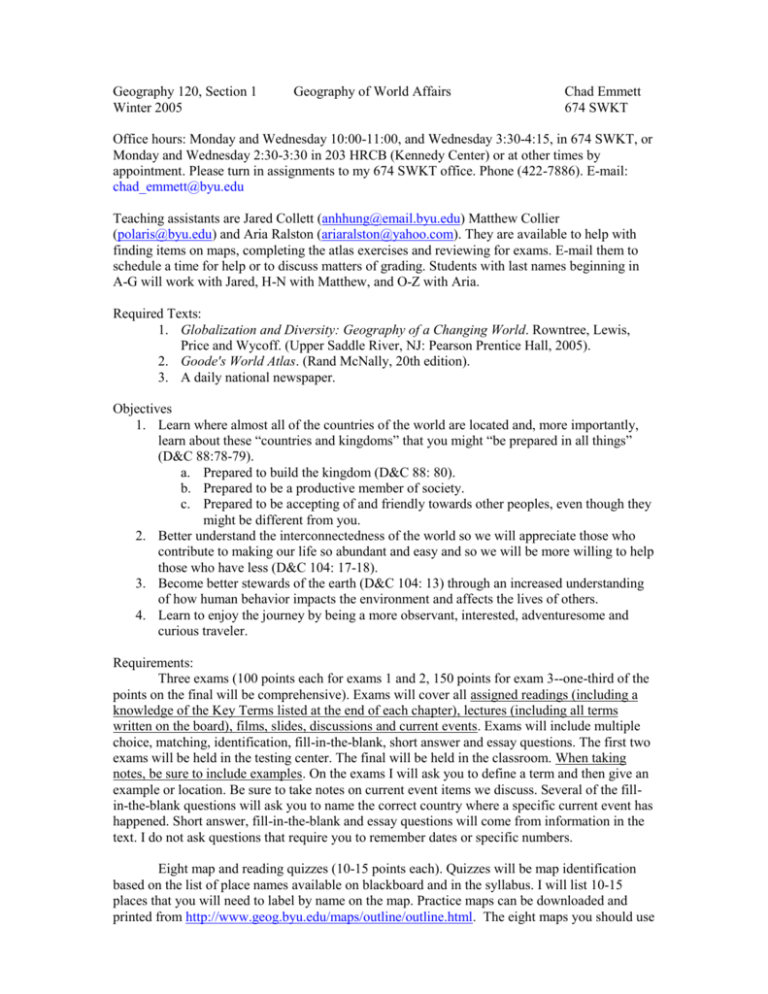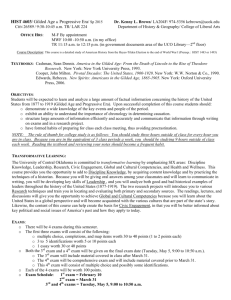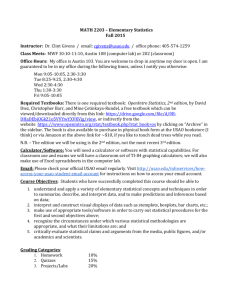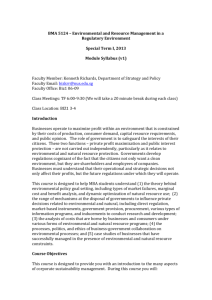
Geography 120, Section 1
Winter 2005
Geography of World Affairs
Chad Emmett
674 SWKT
Office hours: Monday and Wednesday 10:00-11:00, and Wednesday 3:30-4:15, in 674 SWKT, or
Monday and Wednesday 2:30-3:30 in 203 HRCB (Kennedy Center) or at other times by
appointment. Please turn in assignments to my 674 SWKT office. Phone (422-7886). E-mail:
chad_emmett@byu.edu
Teaching assistants are Jared Collett (anhhung@email.byu.edu) Matthew Collier
(polaris@byu.edu) and Aria Ralston (ariaralston@yahoo.com). They are available to help with
finding items on maps, completing the atlas exercises and reviewing for exams. E-mail them to
schedule a time for help or to discuss matters of grading. Students with last names beginning in
A-G will work with Jared, H-N with Matthew, and O-Z with Aria.
Required Texts:
1. Globalization and Diversity: Geography of a Changing World. Rowntree, Lewis,
Price and Wycoff. (Upper Saddle River, NJ: Pearson Prentice Hall, 2005).
2. Goode's World Atlas. (Rand McNally, 20th edition).
3. A daily national newspaper.
Objectives
1. Learn where almost all of the countries of the world are located and, more importantly,
learn about these “countries and kingdoms” that you might “be prepared in all things”
(D&C 88:78-79).
a. Prepared to build the kingdom (D&C 88: 80).
b. Prepared to be a productive member of society.
c. Prepared to be accepting of and friendly towards other peoples, even though they
might be different from you.
2. Better understand the interconnectedness of the world so we will appreciate those who
contribute to making our life so abundant and easy and so we will be more willing to help
those who have less (D&C 104: 17-18).
3. Become better stewards of the earth (D&C 104: 13) through an increased understanding
of how human behavior impacts the environment and affects the lives of others.
4. Learn to enjoy the journey by being a more observant, interested, adventuresome and
curious traveler.
Requirements:
Three exams (100 points each for exams 1 and 2, 150 points for exam 3--one-third of the
points on the final will be comprehensive). Exams will cover all assigned readings (including a
knowledge of the Key Terms listed at the end of each chapter), lectures (including all terms
written on the board), films, slides, discussions and current events. Exams will include multiple
choice, matching, identification, fill-in-the-blank, short answer and essay questions. The first two
exams will be held in the testing center. The final will be held in the classroom. When taking
notes, be sure to include examples. On the exams I will ask you to define a term and then give an
example or location. Be sure to take notes on current event items we discuss. Several of the fillin-the-blank questions will ask you to name the correct country where a specific current event has
happened. Short answer, fill-in-the-blank and essay questions will come from information in the
text. I do not ask questions that require you to remember dates or specific numbers.
Eight map and reading quizzes (10-15 points each). Quizzes will be map identification
based on the list of place names available on blackboard and in the syllabus. I will list 10-15
places that you will need to label by name on the map. Practice maps can be downloaded and
printed from http://www.geog.byu.edu/maps/outline/outline.html. The eight maps you should use
are: U.S. & Canada, Latin America, Africa, Middle East, Western & Central Europe, Former
Soviet Union, Greater Monsoon Asia, and Australia/ Pacific. In addition to the map identification
questions, there will also be 2-3 questions from the assigned chapter readings. For example, your
text (on page 204) talks about the use of polders for reclaiming land for agricultural usage in the
Netherlands. A possible Europe reading/map quiz question might therefore be: Label the country
where polders are used to expand agricultural production in low-lying lands. You would then
have to label Netherlands by name on the map of Europe. Make-up quizzes will only be allowed
under extenuating circumstances and with the prior approval of the instructor. I don't bite so come
see me or call if there are problems or if you need additional help. Quizzes will be given at the
first of class. If you are late you will need to come up at the end of class and hurry and take the
quiz.
Eight atlas exercises (10-15 points each). These assignments are based on your use of
both the Goode's Atlas and your text (the Asia assignment also uses the internet). For many of the
questions you will need to analyze maps and then come up with what you think is the best
answer. The exercises can be found on Blackboard.
Newspaper Project (50 points). Students are to select one region of the world (U.S. and
Canada, Europe, Russian Realm, Oceania, Latin America, sub-Saharan Africa, Middle East and
North Africa, South Asia, Southeast Asia, East Asia,) to follow throughout the semester through
daily readings of a major newspaper--preferably the New York Times (order from the service desk
in the bookstore and pick up daily in bookstore or in front of SWKT), Christian Science Monitor
(sign up in class to have CSM mailed and billed to your home for $25 or go to csmonitor.com to
register for a treeless internet edition for half the price) or Washington Post (all three are available
in the library and some have internet editions); the Salt Lake Tribune or Deseret News will do if
you already have a subscription. As you read the newspaper you should look for articles about
your region that will help you answer the questions below. At the end of the semester you will
need to submit your answers to those questions. The length of you answers will in part depend on
what has happened throughout the semester. Some regions will have more action or newspaper
coverage than others. Each question should be about a half to a full page of typed double spaced
text in 11 or 12 font.
Please give your region of focus and list you primary newspaper source(s) for this project. Be
sure to give full citations for any quotes. Please use proper geographic terminology. In each
section you should underline or bold geographic terms used.
1. List some interesting/unusual characteristics about your region that you were exposed to
this semester from your newspaper readings.
2. How has the physical environment (climate, landforms, soils, water, seas, resources,
natural hazards) of your region influenced its human inhabitants and how have the human
inhabitants of your region influenced, interacted with, abused, or benefited from their
environment this semester? Cite specific examples from your newspaper readings.
3. What factors/events from this semester help explain the level of development in your
region? Why is your region more developed or less developed? Cite specific examples
from your newspaper readings.
4. Explain in some detail what you think are the most significant current challenges (at least
three) your region is now facing? Cite specific examples from your newspaper readings.
5. What would you suggest your region do to overcome its current challenges? Identify at
least three specific proposals that would help make a change for the better in your region.
There is limited extra credit in this class. If you miss or do poorly on a quiz or atlas assignment
you can replace up to two scores (10 or 15 points) with the following: 1) attend an international
lecture on campus such as the weekly lectures at the Kennedy Center (Wednesdays at noon and
other times) or an internationally related devotional or forum and write a one page response about
the lecture including how the topic relates to geography; 2) watch Lawrence of Arabia, Gandhi,
The Mission, The Last Emperor, Seven Years in Tibet, Journey of Hope or The Killing Fields
(rated R for accurately portraying the horrors of genocide) and write your one page response to
the movie including how it relates to geography; 3) visit Bingham Canyon Copper Mine or any
Utah National Park and write a one page response about your visit; 4) contribute at least $25 (via
your ward) to the Perpetual Education Fund or LDS Humanitarian Services and write briefly how
and why your contribution can help less fortunate members/peoples. For those of you who do
well on all of the exercises and quizzes, these extra assignments will count for five points each
towards your over all points.
The faculty of the Geography Department fully support the Honor Code of BYU and we expect
students to abide by it. In cases of academic dishonesty, it is the department policy to give an E
on that part of the course (such as a paper, homework, quizzes, etc) in which academic dishonesty
was involved. If the dishonesty involves a major portion of the course requirements, such as a
midterm or final exam, the student may be given an E for the entire course. If the dishonesty
involves a person knowingly allowing his/her work to be copied then action will also be taken
against that person. Academic dishonesty of any type will be reported to the University Standards
office.
While all students sign the honor code, there are still specific skills most students need to master
over time in order to correctly cite sources, especially in this new age of the internet; as well as
deal with the stress and strain of college life without resorting to cheating. Please know that as
your professor I will notice instances of cheating on exams or plagiarizing on papers. See
http://www.byu.edu/honorcode for specific examples of intentional, inadvertent plagiarism, and
fabrication, falsification.
Title IX of the Education Amendments of 1972 prohibits sex discrimination against any
participant in an educational program or activity that receives federal funds. The act is intended
to eliminate sex discrimination in education. Title IX covers discrimination in programs,
admissions, activities, and student-to-student sexual harassment. BYU’s policy against sexual
harassment extends not only to employees of the university but to students as well. If you
encounter unlawful sexual harassment or gender based discrimination, please talk to your
professor; contact the Equal Employment Office at 378-5895 or 367-5689 (24-hours); or contact
the Honor Code Office at 378-2847.
Brigham Young University is committed to providing a working and learning atmosphere which
reasonably accommodates qualified persons with disabilities. If you have any disability which
may impair your ability to complete this course successfully, please contact the Services for
Students with Disabilities Office (378-2767). Reasonable academic accommodations are
reviewed for all students who have qualified documented disabilities. Services are coordinated
with the student and instructor by the SSD office. If you need assistance or if you feel you have
been unlawfully discriminated against on the basis of disability, you may seek resolution through
established grievance policy and procedures. You should contact the Equal Employment Office
at 378-5895, D-282 ASB.
Schedule (subject to change)
Date
Readings
5 January
7
Chapter 1
10
12
Chapter 2
14
17
MLK Holiday
19
Chapter 3 North America
21
24
26
28
Chapter 4 Latin America
31
2 February
Chapter 5 Caribbean
4
7
No Class
9
11
14
16
18
21
22 (Tuesday)
23
25
28
2 March
4
7
9
11
14
Chapter 6 Africa
16
18
21
23
25
28
30
1 April
4
6
8
11
Chapter 10 Central Asia
13
April 16-21
Chapter 7 North Africa/ SW Asia
Assignments and Exams
Introduction atlas exercise
North America atlas exercise
North America map & reading quiz
Latin America atlas exercise
Latin America map & reading quiz
Exam 1 (testing center Feb. 7-10,
late day Feb 11)
Africa atlas exercise
Africa map & reading quiz
Middle East atlas exercise
President’s Holliday
Middle East map & reading quiz
Chapter 8 Europe
Europe atlas exercise
Europe map & reading quiz
Chapter 9 Russia
Russia atlas exercise
Russia map & reading quiz
No Class
Exam 2 (testing center March 14-17,
late day Mar 18)
Chapter 11 East Asia
Asia atlas exercise
Chapter 12 South Asia
Chapter 13 Southeast Asia
Asia map & reading quiz
Chapter 14 Australia and Oceania
Australia Oceania map & reading
quiz.
Newspaper assignment due
Final Exam in testing center






